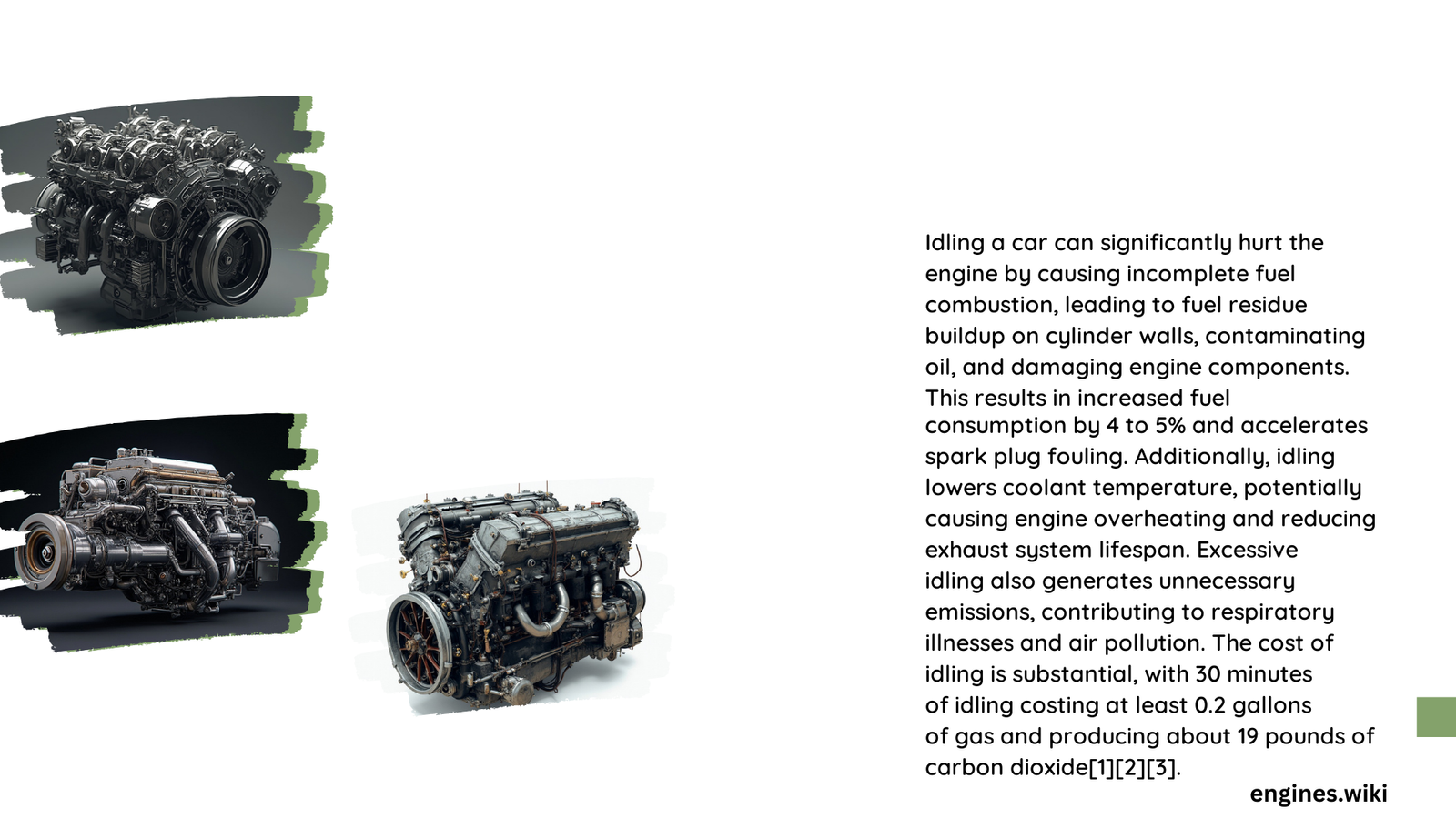Idling a car can indeed hurt the engine, leading to increased wear, reduced fuel efficiency, and potential long-term damage. Prolonged idling causes incomplete fuel combustion, oil degradation, and excessive wear on engine components. While short periods of idling are generally harmless, extended idle times can significantly impact engine health, fuel consumption, and overall vehicle performance.
What Are the Mechanical Effects of Prolonged Idling on Engine Components?
Prolonged idling can have several detrimental effects on various engine components:
- Piston Rings and Cylinder Walls:
- Increased wear due to suboptimal operating temperatures
-
Incomplete fuel combustion leading to carbon buildup
-
Valve Seats:
- Compromised integrity, especially in diesel engines
-
Increased risk of valve seat recession
-
Engine Oil:
- Reduced viscosity due to fuel dilution
-
Decreased effectiveness of oil additives
-
Fuel System:
- Incomplete combustion leading to carbon deposits
- Potential clogging of fuel injectors
Quantifiable Impact on Engine Wear
While exact quantification varies by vehicle and conditions, studies have shown:
- Excessive idling (e.g., over 700 hours) can be equivalent to 10,000 miles of driving in terms of engine wear
- Taxi cabs with higher idle times required more frequent oil changes and maintenance despite lower mileage
How Does Idling Affect Engine Oil Degradation?

Idling significantly impacts engine oil quality and performance:
- Viscosity Reduction:
- Fuel dilution during idling decreases oil viscosity
-
Reduced viscosity compromises oil’s protective properties
-
Additive Depletion:
- Lower concentrations of crucial oil additives
-
Decreased ability to neutralize acids and prevent corrosion
-
Contamination Buildup:
- Increased sludge and varnish formation
- Accelerated oil oxidation due to prolonged exposure to heat
Temperature Ranges and Timeframes
| Idling Duration | Effect on Oil |
|---|---|
| Short-term (<5 minutes) | Minimal impact |
| Medium-term (5-30 minutes) | Gradual degradation begins |
| Long-term (>30 minutes) | Significant oil quality reduction |
What Is the Fuel Consumption Rate While Idling?
Idling vehicles consume a surprising amount of fuel:
- Average Consumption: 0.04 to 0.08 gallons per minute
- Hourly Consumption: Approximately 2.4 to 4.8 gallons per hour
Fuel Consumption by Vehicle Type
| Vehicle Type | Approximate Fuel Consumption (per hour) |
|---|---|
| Passenger Car | 0.16 – 0.39 gallons |
| Light-Duty Truck | 0.26 – 0.59 gallons |
| Heavy-Duty Truck | 0.82 – 1.5 gallons |
This fuel consumption not only wastes resources but also contributes to increased engine wear and emissions.
How Does Idling Duration Relate to Engine Life?
The relationship between idling duration and engine life is complex but significant:
- Accelerated Wear:
- Prolonged idling increases wear on engine components without advancing the odometer
-
Can lead to premature engine failure if excessive
-
Maintenance Frequency:
- Vehicles with high idle times often require more frequent oil changes and maintenance
-
Increased risk of component failure due to suboptimal operating conditions
-
Engine Efficiency:
- Extended idling can lead to carbon buildup, reducing engine efficiency over time
- May result in decreased power output and increased fuel consumption
Case Study: Taxi Cab Idle Time vs. Engine Wear
A study on Las Vegas taxi cabs revealed:
- Cabs with similar hours of operation but different idle times showed significant variations in maintenance needs
- Vehicles with higher idle times required more frequent oil changes and repairs despite lower mileage
What Are the Long-Term Consequences of Excessive Idling?
Excessive idling can lead to several long-term issues:
- Reduced Engine Lifespan:
- Increased wear on critical components can shorten overall engine life
-
Potential for premature engine rebuilds or replacements
-
Decreased Fuel Efficiency:
- Carbon buildup from incomplete combustion reduces engine efficiency
-
Can lead to increased fuel consumption even during normal driving
-
Higher Maintenance Costs:
- More frequent oil changes and component replacements
-
Increased likelihood of major repairs due to accelerated wear
-
Environmental Impact:
- Unnecessary emissions contribute to air pollution
- Wasted fuel resources
How Can Drivers Minimize Engine Damage from Idling?
To protect your engine from the harmful effects of excessive idling:
- Limit Idle Time:
- Turn off the engine if you expect to be stationary for more than 30 seconds
-
Use remote starters sparingly, especially in cold weather
-
Proper Warm-Up:
- Modern engines require minimal warm-up time (usually less than 30 seconds)
-
Avoid prolonged idling to warm up the engine, especially in cold climates
-
Regular Maintenance:
- Follow manufacturer-recommended oil change intervals
-
Consider more frequent oil changes if your driving habits include significant idle time
-
Monitor Engine Health:
- Pay attention to warning lights and unusual engine sounds
- Use engine diagnostic tools to check for issues related to excessive idling
By understanding the impact of idling on engine health and taking proactive measures, drivers can significantly extend the life of their vehicles and reduce unnecessary fuel consumption and emissions.
